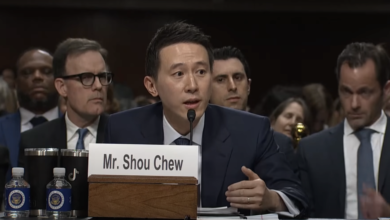Photo: A worker walks through an Intel plant in Chandler, Arizona. Credit: Carol M. Highsmith Archive, Library of Congress, Prints and Photographs Division
The U.S. government is set to give leading microchip manufacturer Intel an $8.5 billion grant, in addition to up to $11 billion in loans and additional tax credits. President Biden announced the grant, part of the massive $280 billion CHIPS Act, on March 20 in Arizona.
Intel hardly needs a bailout from the government. The company reported a gross profit of $27.71 billion for the year 2023 on $54.23 billion in revenue. While financial analysts fret about Intel’s shrinking profits and lack of quarter-to-quarter growth as it posted its first net loss in over 30 years in 2022, the company’s numbers far outpace its primary competitor in the field of consumer and server-level chips, AMD. Intel maintains a 78% marketshare of PC chips globally, with AMD accounting for 13%. Like many other companies, it’s investing significantly in the types of chips that are best used to power AI algorithms. In January, it split out its enterprise AI software business Articul8 AI with a large group of investment and venture capital firms. Articul8 AI’s software will be optimized for Intel’s AI hardware, which will then increase demand for the equipment, leading to more sales for Intel’s core business.
CEO of Intel Pat Gelsinger was lauded for taking a 25% cut to his pay in 2023 as the company’s stock fell 50% since he took the job in 2021, but that only impacted his base salary of $1.25 million, an insignificant fraction of Gelsinger’s total compensation of nearly $179 million in 2021. In 2022, Gelsinger still made $11.6 million. The average per-capita income for Maricopa County, Arizona, where Chandler is, is just $41,261.
And while the semiconductor industry moved jobs overseas, companies like Intel, along with IBM, Qualcomm, Texas Instruments, and Broadcom spent a staggering $249 billion — or 70% of their profit — on stock buybacks between 2011-2020, lining the pockets of their executives and shareholders.
Intel is also a target of the international Boycott, Divestment and Sanctions movement. On March 19, the day before the Arizona announcement, the Palestinian BDS National Committee launched the #BoycottIntel campaign, citing the company’s plans for a $25-billion foundry in Israel. Between grants, loans with generous terms and tax breaks, Intel’s benefit from the CHIPS Act funding comes up to approximately $25 billion. Intel already has facilities in the Israeli settlement of Kiryat Gat. The BDS National Committee also noted, “In 2020, Intel was indirectly employing some 53,000 workers in Israel, and in 2022 Intel Israel declared record exports of $8.7 billion, constituting 1.75% of Israel’s entire GDP and 5.5% of all Israeli tech exports.”
Where will the money go?
Biden has framed the CHIPS announcement as a boon to the working class, but most of the jobs it would create would only be temporary. The federal funds will go to two plants each in Chandler, Arizona and New Albany, Ohio, and will upgrade an existing plant in Arizona. Intel and the Biden administration are touting a total of 30,000 jobs to be created, but according to the New York Times, only around 10,000 of those will be manufacturing jobs. The other 20,000 will be construction jobs for the new projects. Once the plants are open, the construction jobs will end. In 2022, Intel had announced a new $20 billion fab, or chip manufacturing plant, to be built in New Albany, Ohio. Just a month before the scheduled July 22 groundbreaking, as Congress debated and stalled on passing the CHIPS Act, Intel announced they were putting the New Albany project on hold, effectively holding the government and workers hostage unless the government bailed them out.
Further, while Intel’s press releases tout their “commitment to corporate responsibility,” the company has a history of creating danger for workers and those who live near their plants. Throughout California’s Silicon Valley, where the microprocessor industry in the United States got its start, the Environmental Protection Agency has identified a number of Superfund sites where contaminants from the fabrication process have seeped into the dirt and groundwater. An EPA report on Intel’s Mountain View plant, which it used from 1968 to 1981, notes that reducing the levels of dangerous tricloroethene (TCE) chemicals will take “many decades.” TCE was used as a solvent, and the CDC notes that prolonged exposure can cause among other issues, confusion, nausea, liver damage, and death. Business practices that disregard the environment and health of workers, along with a lack of real environmental protections and enforcement, mean that facilities like this across Silicon Valley were leaking TCEs and other chemicals, poisoning water and the people who live nearby.
Part of new Cold War strategy
The massive investment in Intel and other chip manufacturers under the 2022 CHIPS Act is part of the greater move by the United States to contain China.
During a press call about the Intel grants, Secretary of Commerce Gina Raimondo told reporters, “We rely on a very small number of factories in Asia for all of our most sophisticated chips. That’s untenable and unacceptable. It’s an economic security problem. It’s a national security problem. And we’re going to change that.”
In their own words, it is “untenable and unacceptable” for China to lead the United States in any field. The imperialist order demands that China and other countries only develop to levels that are necessary for continued exploitation of labor, resources and markets, rather than allowing development on their own terms. Even with this massive influx of capital to private companies like Intel, Raimondo also said the target is only to have 20% of global chip production in the United States by 2030.
It is clear that Biden’s subsidy is once again a huge giveaway of public funds to a massive top 100 corporation. While framed as an investment in American manufacturing and beneficial to U.S. workers, it is merely another front in the new Cold War against China. Workers should not be forced to subsidize giant, multi-billion dollar companies and the outrageous salaries that their CEOs and investors make, or be told they’re competing with Chinese workers for jobs. Corporations like Intel should be seized and turned into public property — owned by the working class who created that wealth in the first place.





